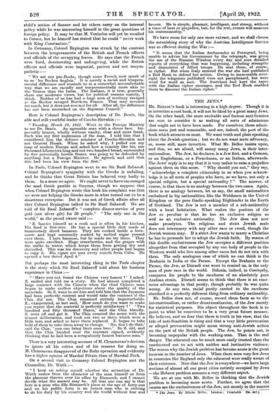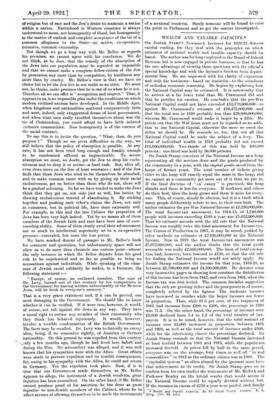THE JEWS.*
Ma. BELLoc's book is interesting in a high degree. Though it is in intention a cool book, it will not be liked by a great many Jews. On the other hand, the more excitable and furious anti-Semites are sure to consider it as making all sorts of admissions that ought not to have been made. For ourselves, these admis- sions seem just and reasonable, and are, indeed, the part of the book which attracts us most. We want truth and plain speaking about the Jewish question ; but we do not want mere advocacy, or, worse still, mere invective. What Mr. Belloc insists upon, and this, we are afraid, will annoy many Jews, is their inter- nationalism. The Jew, he declares, is a Jew first, and a German, or an Englishman, or a Frenchman, or an Italian, afterwards. The Jews' reply is to say that it is very unfair to raise a prejudice against them on this score. " Why should you not," they say, " acknowledge a complete citizenship in us when you acknow- ledge it in all sorts of peoples who have, as we have, not only a special religion, but a special nationality ? " The answer, of course, is that there is no analogy between the two cases. Again, there is no analogy between, let us say, the small nationalities embalmed in big nationalities, like the Welshmen in the United Kingdom or the pure Gaelic-speaking Highlander in the North of Scotland. The Jew is not a member of a sub-nationality with a local habitation. What makes the position of the Jew so peculiar is that he has an exclusive religion as well as an exclusive nationality. The Jew does not now make proselytes. The religious and strict Jewish male does not intermarry with any other race or creed, though the Jewish woman may. If a strict Jew wants to marry a Christian he has to persuade her to adopt the Jewish faith. By reason of this double exclusiveness the Jew occupies a different position altogether from that occupied by any one body of people in the Western world who live among other races but do not mix with them. The only analogous case of which we can think is the Brahmin in India or the Parsee. Except the Brahmin or the Parsee, the Jew, as Disraeli was wont to remind us, is the only man of pure race in the world. Sidonia, indeed, in Coningsby, compares his people to the racehorse of an absolutely pure Arabian strain.' Disraeli seems to think that there is an enor- mous advantage in that purity, though probably he was quite wrong. At any rate, racial purity carried to the racehorse standard is a perfectly different thing from ordinary nationality.
Mr. Belloc does not, of course, record these facts as to the internationalism, or rather denationalization, of the Jew merely for statistical purposes. His object throughout the book is to point to what he conceives to be a very great future menace. He believes, and we fear that there is truth in his view, that the tide of anti-Semitism is rising and that a very little provocation or alleged provocation might mean strong anti-Jewish action on the part of the British people. The Jew, he points out, is becoming unpopular with the working-man. That is the real danger. The educated can be much more easily trusted than the uneducated not to act with sudden and instinctive violence. The reason why the Jewish problem has become acute is the great increase in the number of Jews. When there were very few Jews in countries like England only the educated were really aware of their existence. Now that the Jew is everywhere—we have large sections of almost all our great cities entirely occupied by Jews the Hebrew problem assumes a very different aspect.
We are at one with Mr. Belloo in thinking that the Jewish problem is becoming more acute. Further, we agree that the causes are the exclusiveness of the Jew, not merely in the matter • The Vacs. By Hilaire Delloc. London : Condolee hue. set.)
of religion -but of race and the Jew's desire to maintain a nation within & nation. Nationhood in Western countries is always
understood to mean, not homogeneity of blood, but homogeneity in the matter of outlook and complete acceptance of the tie of a common allegiance to the State—an active, co-operative,
intensive, common citizenship.
But though we go a long way with Mr. Belloc as regards Ws- premises, we cannot agree with his conclusion. We do not think, as he does, that the remedy of the absorption of the JeWs into our population must be regarded as impossible
and that we cannot make a complete fellow-citizen of the Jew by persuasion any more than by compulsion, by kindliness any more than by cruelty. Mr. Belloc's view is that we have no choice but to let the Jew live in our midst as an alien. We must not, he thinks, make pretence that he is one of us when he is not.
Therefore all we can offer is " recognition and respect." That, it appears to us, is an impossible plan under the conditions on which modern civilized nations have developed. In the Middle Ages, when kingdoms and nationalities mattered comparatively little and were, indeed, only exaggerated forms of local government, and when what men really troubled themselves about was the tie of Christendom, you could afford to have little isolated Jxclusive communities. Now homogeneity is of the essence of the social contract.
To say this is to invite the question, " What, then, do you propose ? " Though we see great difficulties in the way, we still believe that the policy of absorption is possible. At any rate, it has not been tried long enough and frankly enough to be condemned offhand as impracticable. To secure absorption we must, no doubt, get the Jew to drop his exclu-
siveness and to drop it ex ammo—a hard task. But, after all, even Jews move on the line of least resistance ; and if the Jew finds that those Jews who tend to let themselves be absorbed, and to make common cause with us by giving up their racial exclusiveness, get on better than those who do not, there will be a gradual softening. So far we have tended to make the Jews think that they get on, not only just as well, but better, by showing exclusiveness instead of abandoning it. By sticking together and pushing each other's claims the Jews, not only
in commerce, but in political life, have done extremely well. For example, in this and the late Cabinet the proportion of Jews has been very high indeed. Yet by no means all of these members of the Jewish faith and race have been men of com- manding ability. Some of them clearly owed their advancement not so much to intellectual superiority as to a co-operative pressure—concealed, but none the lc as potent.
We have marked dozens of passages in Mr. Belloc's book for comment and quotation, but unfortunately space will not allow us to do more than chronicle one curious point—almost the only instance in which Mr. Belloc departs from his good rule to be unpolemical and so far as possible to bring no accusations against individuals. While speaking of the close- ness of Jewish racial solidarity he makes, in a footnote, the following statement :—
" Except, of course, an outlawed member. The case of Dr. Levy, turned out of this country by his compatriots in the Government for-having written unfavourably of the Moscow Jews, will be fresh in everyone's memory."
That is a very grave statement and, if it can be proved, one most damaging to the Government. We should like to know whether it can be verified. If it were true, however, it would, of course, not tell against the Jews in any way. They have a moral right to outlaw any member of their community who they think has behaved injuriously. It would, however, involve a terrible condemnation of the British Government.
The facts may be recalled. Dr. Levy was technically an enemy alien, being, if we remember rightly, of Austrian or German
'nationality. On this ground he was expelled from this country manly a few months ago, though he had lived here befoib 'and during the War. No misconduct was alleged, and it was well
known that his sympathies were with the Allies. Great efforts were made to prevent expulsion and its terrible consequences, for, owing to his sympathy with the Allies, he could not return to Germany. Yet the expulsion took place. Now, if it is true that our Government made themselves, as -Mr. Belloc appears to allege, the instrument of a Jewish vendetta, great injustice has been committed. On the other hand, if Mr. Belloc cannot produce proof of his aasertion, he has done as great injustice to non-Jewish members of the Cabinet, whom he in effect -accuses of allowing themselves to be made the instruments of a sectional vendetta. Surely someone will be found to -raise the point in Parliament and so get the matter investigated.



































 Previous page
Previous page